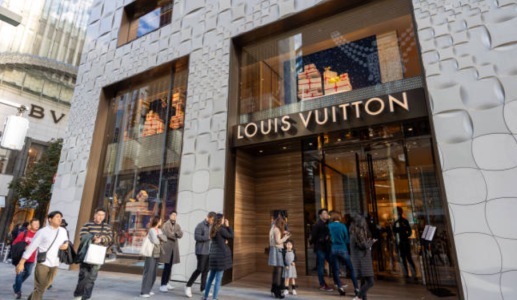Is Your Personal Info at Risk? Aussies' Private Data Stolen in Shocking Louis Vuitton Hack
By
Gian T
- Replies 0
If you’re a fan of a little luxury—or just like to window shop the finer things in life—you might want to check your inbox. In a digital age where our personal details are more valuable than ever, even the world’s most prestigious brands aren’t immune to cybercrime. This week, Louis Vuitton, the iconic French fashion house famous for its monogrammed handbags and timeless style, revealed a major data breach that’s left thousands of Australians exposed.
What Happened?
On July 2, an unauthorised third party managed to infiltrate Louis Vuitton’s systems, gaining access to a treasure trove of customer information. While the company was quick to assure clients that no financial data (like credit card numbers or bank details) was stolen, the breach is still deeply concerning. The hackers reportedly accessed:
- First and last names
- Gender
- Country
- Phone numbers
- Email addresses
- Postal addresses
- Dates of birth
- Purchase history and preferences
- Passport numbers
Yes, you read that right—passport numbers. For many, that’s a level of personal detail that goes far beyond the usual email and phone number leaks we’ve sadly become accustomed to.
Who’s Affected?
Initially, the breach was thought to be limited to customers in South Korea, Turkey, the UK, Italy, and Sweden. But as investigations continued, it became clear the problem was much bigger. On Monday, it was revealed that over 419,000 customers in Hong Kong were affected, and now, Australians are officially on the list.
If you’ve shopped with Louis Vuitton—whether online or in-store—there’s a chance your details could be among those compromised. The company has begun contacting affected clients directly via email, so keep an eye out for any official communication.
What Is Louis Vuitton Doing About It?
Louis Vuitton, which sits under the luxury conglomerate LVMH (alongside Dior and Tiffany & Co.), says its cybersecurity teams acted swiftly to contain the breach. The company claims the unauthorised access was blocked as soon as it was detected, and that they’re working diligently to prevent further incidents.
In their email to customers, Louis Vuitton stressed:
‘We regret to inform you that an unauthorised third party temporarily accessed our system and obtained some of your information… Our cybersecurity teams have taken care of the incident with the utmost diligence and attention.’
What Should You Do Now?
While Louis Vuitton says there’s currently no evidence that the stolen data has been misused, they’re urging customers to stay vigilant. Here’s what you can do to protect yourself:
- Be wary of suspicious emails, calls, or texts. Scammers may use your details to try and trick you into revealing more information or clicking malicious links.
- Never share your Louis Vuitton password (or any other passwords) with anyone. The company will never ask for it.
- Monitor your accounts for any unusual activity, especially if you use the same email or password elsewhere.
- Consider changing your passwords for any accounts that might be linked to the compromised email address.
- Be extra cautious with your passport details. If you suspect your passport number has been misused, contact the Australian Passport Office for advice.
Why Are Luxury Brands Targeted?
You might wonder why hackers would go after a fashion label. The answer is simple: luxury brands attract high-value customers, and their databases are a goldmine for cybercriminals. Not only do they contain contact details, but also information about spending habits, travel, and even identification documents like passports.
Unfortunately, Louis Vuitton isn’t alone. Its sister brands Dior and Tiffany & Co. have also suffered similar breaches in recent months, highlighting a growing trend of cyberattacks targeting the world’s most exclusive names.
The Bigger Picture: Protecting Your Data in 2024
Data breaches are becoming more common, and it’s not just luxury shoppers who are at risk. From airlines to supermarkets, no company is immune. The best defence is to stay informed, use strong and unique passwords, and be cautious about the information you share online.
Have You Been Affected?
We know many of our members enjoy a bit of luxury now and then—whether it’s a special treat or a well-earned splurge. Have you received an email from Louis Vuitton about this breach? Have you ever been caught up in a data leak before? How did you handle it?
Share your experiences, tips, or concerns in the comments below. Your story could help others stay safe!
 And remember: in a world where even the fanciest brands can’t guarantee your privacy, a little caution goes a long way. Stay safe, SDC members!
And remember: in a world where even the fanciest brands can’t guarantee your privacy, a little caution goes a long way. Stay safe, SDC members!
Read more: Qantas hit by massive data breach! Millions at risk after offshore security failure
What Happened?
On July 2, an unauthorised third party managed to infiltrate Louis Vuitton’s systems, gaining access to a treasure trove of customer information. While the company was quick to assure clients that no financial data (like credit card numbers or bank details) was stolen, the breach is still deeply concerning. The hackers reportedly accessed:
- First and last names
- Gender
- Country
- Phone numbers
- Email addresses
- Postal addresses
- Dates of birth
- Purchase history and preferences
- Passport numbers
Yes, you read that right—passport numbers. For many, that’s a level of personal detail that goes far beyond the usual email and phone number leaks we’ve sadly become accustomed to.
Who’s Affected?
Initially, the breach was thought to be limited to customers in South Korea, Turkey, the UK, Italy, and Sweden. But as investigations continued, it became clear the problem was much bigger. On Monday, it was revealed that over 419,000 customers in Hong Kong were affected, and now, Australians are officially on the list.
If you’ve shopped with Louis Vuitton—whether online or in-store—there’s a chance your details could be among those compromised. The company has begun contacting affected clients directly via email, so keep an eye out for any official communication.
What Is Louis Vuitton Doing About It?
Louis Vuitton, which sits under the luxury conglomerate LVMH (alongside Dior and Tiffany & Co.), says its cybersecurity teams acted swiftly to contain the breach. The company claims the unauthorised access was blocked as soon as it was detected, and that they’re working diligently to prevent further incidents.
In their email to customers, Louis Vuitton stressed:
‘We regret to inform you that an unauthorised third party temporarily accessed our system and obtained some of your information… Our cybersecurity teams have taken care of the incident with the utmost diligence and attention.’
What Should You Do Now?
While Louis Vuitton says there’s currently no evidence that the stolen data has been misused, they’re urging customers to stay vigilant. Here’s what you can do to protect yourself:
- Be wary of suspicious emails, calls, or texts. Scammers may use your details to try and trick you into revealing more information or clicking malicious links.
- Never share your Louis Vuitton password (or any other passwords) with anyone. The company will never ask for it.
- Monitor your accounts for any unusual activity, especially if you use the same email or password elsewhere.
- Consider changing your passwords for any accounts that might be linked to the compromised email address.
- Be extra cautious with your passport details. If you suspect your passport number has been misused, contact the Australian Passport Office for advice.
Why Are Luxury Brands Targeted?
You might wonder why hackers would go after a fashion label. The answer is simple: luxury brands attract high-value customers, and their databases are a goldmine for cybercriminals. Not only do they contain contact details, but also information about spending habits, travel, and even identification documents like passports.
Unfortunately, Louis Vuitton isn’t alone. Its sister brands Dior and Tiffany & Co. have also suffered similar breaches in recent months, highlighting a growing trend of cyberattacks targeting the world’s most exclusive names.
The Bigger Picture: Protecting Your Data in 2024
Data breaches are becoming more common, and it’s not just luxury shoppers who are at risk. From airlines to supermarkets, no company is immune. The best defence is to stay informed, use strong and unique passwords, and be cautious about the information you share online.
Have You Been Affected?
We know many of our members enjoy a bit of luxury now and then—whether it’s a special treat or a well-earned splurge. Have you received an email from Louis Vuitton about this breach? Have you ever been caught up in a data leak before? How did you handle it?
Share your experiences, tips, or concerns in the comments below. Your story could help others stay safe!
Key Takeaways
- Australian Louis Vuitton customers have had their personal data exposed in a recent data breach, including home addresses, passport numbers, phone numbers and email addresses.
- The incident, caused by unauthorised access on 2 July, did not involve the theft of any financial information.
- Louis Vuitton has assured customers that cybersecurity teams acted swiftly to contain the incident and has urged affected clients to stay vigilant for suspicious emails, phone calls, or texts.
- The brand warned customers not to share their Louis Vuitton password and clarified that they will never be asked to disclose it, while also noting that similar breaches have impacted other LVMH brands like Dior and Tiffany & Co recently.
Read more: Qantas hit by massive data breach! Millions at risk after offshore security failure








